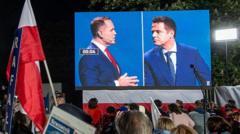Voters prepare for a pivotal moment in Polish history, as two primary candidates vie for a chance at leadership amidst a backdrop of longstanding political tension.
Tight Race Looms in Poland’s Presidential Election with Potential for Change

Tight Race Looms in Poland’s Presidential Election with Potential for Change
Poland's upcoming presidential election may reshape the nation's political landscape.
As Poland gears up for its presidential election this Sunday, expectations are high for a competitive showdown between the leading candidates: Rafal Trzaskowski, the liberal mayor of Warsaw, and Karol Nawrocki, a national-conservative historian. Current projections indicate that the election may culminate in a second-round runoff between the two frontrunners, setting the stage for a critical juncture in Poland's political narrative.
Polling suggests Trzaskowski, a prominent figure within the Civic Platform (PO) party led by former Prime Minister Donald Tusk, holds a slight advantage. Nawrocki, affiliated with the opposition Law and Justice (PiS) party which recently relinquished power, is trailing by narrow margins. With the president's authority to veto government legislation, the outcome of this election bears substantial implications for Poland's governance, especially as Tusk's coalition lacks the majority needed to counter the veto power that outgoing President Andrzej Duda, a PiS ally, has wielded in the past.
The political horizon has been characterized by a mix of hope and frustration for many voters. Tusk's return to power has been hailed by some as a step back towards liberal democracy, following eight years of right-wing governance. However, critics argue that both parties have compromised essential values, with Tusk's government accused of employing dubious tactics in restoring media control while failing to fulfill promises related to women's rights and migration policy.
As the election day draws near, key social issues—like LGBTQ+ rights and immigration—remain at the forefront of public discourse. Observers have noted a visible shift in candidate strategies, with both contenders navigating a landscape marked by public fatigue towards the political status quo and a yearning for authentic representation on pressing societal concerns.
While Trzaskowski aims to solidify his position on these matters, Nawrocki's campaign has faced recent scrutiny linked to a controversial flat purchase from a vulnerable elderly person. Despite the backlash, public opinion appears largely unaffected as both candidates position themselves over critical issues of security, migration, and national interests within the European Union.
The cacophony of voices from the electorate reflects a deeper sentiment of disenchantment with the traditional party duopoly—between the PO and PiS. As younger voters express their desire for authentic change, the outcomes of this race could signal a pivotal shift in how Polish politics and governance are approached in the years to come.
Ultimately, while polls indicate a likely runoff decision in June, Poland finds itself at a crossroads, with profound implications for its national identity and political future.






















